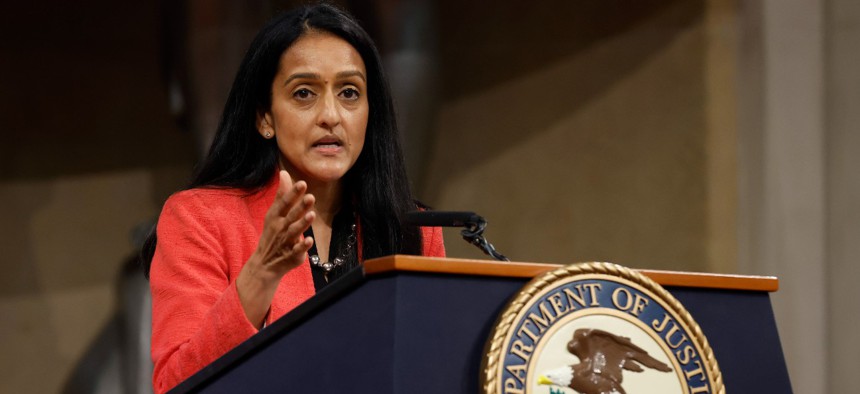
Associate Attorney General Vanita Gupta delivers remarks during an event to mark the first anniversary of the COVID-19 Hate Crimes Act at the Justice Department on May 20. Chip Somodevilla/Getty Images
The Justice Department Is Ramping Up Its Anti-Hate Crime Efforts
New personnel, guidance and grants were announced on Friday.
The federal government is doubling down on its efforts to prevent hate crimes, a year after the passage of sweeping legislation to address the issue.
The Justice Department announced a slew of actions on Friday in commemoration of the one-year anniversary of the COVID-19 Hate Crimes Act––which included the Jabara-Heyer NO HATE Act––that came in response to the rise of violence and hate crimes targeted at Asian Americans and Pacific Islanders during the pandemic.
Referencing the mass shooting in Buffalo, New York on May 14, Associate Attorney General Vanita Gupta said on Friday, “as we mourn with the families of the horrific attacks of hate this past week, all of us here today––DOJ, [the Health and Human Services Department] and agencies across the federal government; legislators and other government officials; advocates like Susan Bro and Haifa and Victoria Jabara; civil rights and community-based groups; public health professionals; victim services; and law enforcement partners across the country––we must leverage all of our expertise to combat hate.”
Among the new actions, Ana Paula Noguez Mercado, a community advocate and interpreter, was tapped to be the Justice Department’s first-ever Language Access Coordinator.
“Ana will join our Office for Access to Justice where she will work to improve knowledge, use, and expansion of the department’s language access resources,” said Attorney General Merrick Garland during his remarks. “We know that language access is a major barrier to the reporting of hate crimes and hate incidents.”
Saeed Mody, a veteran of the Justice Department’s civil rights division, will take over as the department’s new Anti-Hate Crimes Resources Coordinator, after the first ever coordinator, Rachel Rossi, was named director of the recently restored Office of Access to Justice.
Additionally, the Justice Department, along with HHS, issued new guidance that seeks to increase awareness of hate crimes during the pandemic as well as released $10 million in grant solicitations for new programs to address hate crimes and incidents.
This builds on efforts Justice has taken over the past year such as launching the National Anti-Hate Crimes Campaign led by the FBI; assigning at least one assistant U.S. Attorney to be a civil rights coordinator in every U.S. Attorneys’ Office; and “vigorously investigating and prosecuting hate crimes,” said a press release from the department.
The FBI’s report for 2020 showed that the number of reported hate crimes in the United States (8,263) reached its highest level in 12 years.
However, “non-reporting and underreporting of hate crimes by law enforcement to the FBI’s Uniform Crime Reporting Program have been longstanding issues,” said the new guidance. Also, “there are many reasons that victims and witnesses may underreport hate crimes and hate incidents,” and according to a survey conducted before the pandemic, the most common reason for not going to the police was that “the incident was handled another way, such as privately or through a non-law enforcement official.”
The recent shooting in Buffalo left 10 people killed and another three injured, the majority of whom were Black, and Justice is investigating it as a hate crime and act of racially motivated violent extremism. Garland said this “was a painful reminder of the singular impact that hate crimes have not only on individuals, but on entire communities.”







